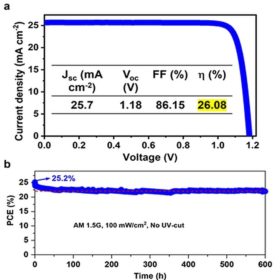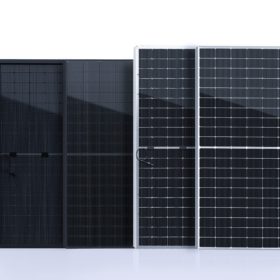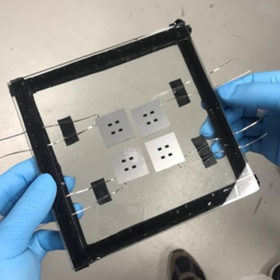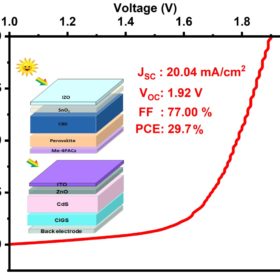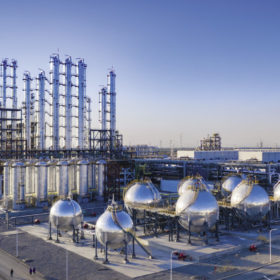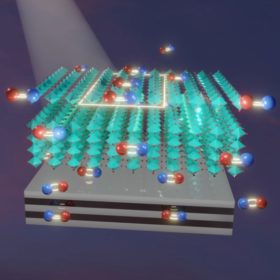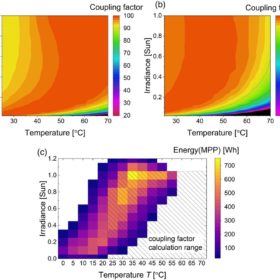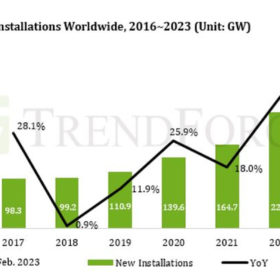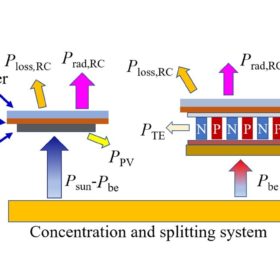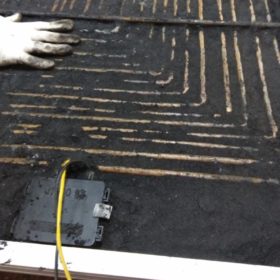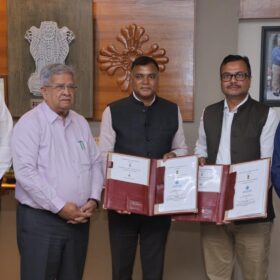Perovskite alkylammonium chloride solar cell achieves 26.08% efficiency
The US National Renewable Energy Laboratory (NREL) has certified that a South Korean research team has achieved a 25.73% efficiency rating with a perovskite PV cell based on alkylammonium chlorides. The champion device built by the scientists reached an efficiency of 26.08%.
SEG Solar releases 580 W TOPCon solar modules with 22.45% efficiency
California-based SEG Solar says its new panels have a temperature coefficient of -0.30% per degree Celsius. They come with a 30-year power output guarantee for 87.4% of the initial yield.
Inverted perovskite solar cell achieves 23.9% efficiency, high durability
A US-Canadian group of scientists has used Lewis base molecules to improve surface passivation in a perovskite solar cell. The team produced a device with a high open-circuit voltage and remarkable stability levels.
Perovskite-CIGS tandem solar cell design promises 29.7% efficiency
A numerical study by researchers at India’s Chitkara University shows enhanced performance in the top device of a tandem solar cell based on copper indium gallium selenide (CIGS). The design had a higher open-circuit voltage, with the top cell acting as a current-limiting cell.
Longi raises wafer prices as polysilicon hits $34.98/kg
The China Nonferrous Metals Industry Association (CNMIA) said that prices for monocrystalline silicon ranged from CNY 222 ($32.30)/kg to CNY 248/kg last week, up 31.37% from the middle of January. Longi, meanwhile, has raised its wafer prices by more than 15%.
US scientists improve photoresponsivity in solar perovskite by 250%
Researchers led by the University of Rochester claim to have increased the photoresponsivity of a lead-halide perovskite for solar cell applications by 250%. They created a perovskite film with a plasmonic substrate made of hyperbolic metamaterial and characterized it with transition dipole orientation.
Replacing MPPT with direct PV-battery coupling
Researchers in Germany have assessed direct coupling and integration between PV and batteries at the scale of a single PV module. They say their solution could be cheaper and provide superior performance than maximum power point tracking (MPPT) in optimizing PV system performance.
Global solar installations may hit 350.6 GW in 2023, says TrendForce
TrendForce says solar demand could grow by more than 53.4% this year due to lower module prices and delayed projects from 2021 and 2022 that are now going online. China will be the largest market this year with 148.9 GW, followed by the United States with 40.5 GW, India with 17.2 GW, Brazil with 14.2 GW, Germany with 11.8 GW, Spain with 11.4 GW, and Japan with 8 GW.
Photovoltaic-thermoelectric tech with potential efficiency of 65%
Chinese scientists have simulated a new photovoltaic-thermoelectric technology, based on radiative cooling and III-V solar cells, to generate electricity at night.
Photovoltaic-thermal module based on biochar-PCM achieves 79.6% efficiency
Indian scientists have developed a panel with an electrical efficiency of 13% and and thermal efficiency of 66.6 %. They built the system with a 100 W PV panel, a rectangular absorber, and a cooling technique based on a phase change material (PCM) that uses biochar derived from water hyacinth.

